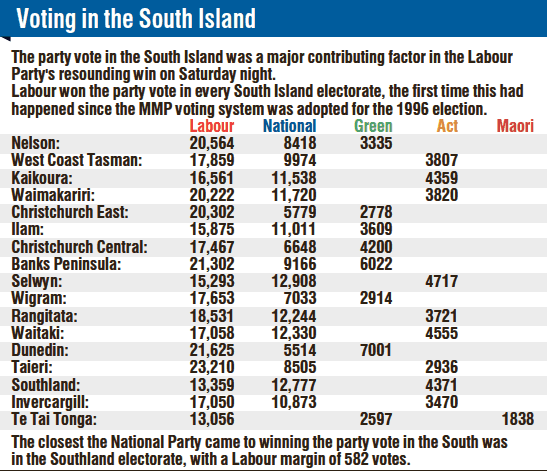While National held on to six electorates in the South — including Invercargill, Southland and Waitaki — it lost the party vote in all 16 South Island seats, many for the first time.
Of the 15 seats National lost in Saturday’s shellacking, three were in the South Island.
Labour had dared to dream to take Nelson from long-serving MP Nick Smith, but a 3577 majority for Rachel Boyack in a seat her party had not held since 1993 was an eye-opener.
If that was surprising, Jo Luxton claiming Rangitata — a seat National won with a 6331 majority in 2017 — by 3484 votes was astonishing.
Most far-fetched of all, National deputy leader Gerry Brownlee was dethroned from the Ilam seat where he has been the MP since its foundation in 1996.
Brownlee — with an 8236 majority in 2017 — lost to Labour’s Sarah Pallett by 2220; it was not even close.
Ms Pallett was struck dumb by the enormity of what she had achieved, and Labour gatherings across the South experienced similar emotions as electorates where anything labelled blue would traditionally waltz to victory danced off to the red column.

The southern rural heartland, the bedrock of National election success for decades, has been lost and party strategists will now be wondering if they can ever find it again.
Farmers eschewed National to vote for Act New Zealand — in Southland the Act party vote soared from 142 in 2017 to 4371 in 2020.
Some also, no doubt with severe misgivings, voted for Labour — either in gratitude for the Covid-19 response or to try to give Labour an absolute majority and limit the influence of the Green party.
Why ever National lost — and much soul-searching is still to come on that score — the fact remains that Labour won, and won big time.
The 2020 election was held against the backdrop of a global pandemic, and was effectively a referendum on Prime Minister Jacinda Ardern’s handling of the health crisis.
While that has not been perfect, yesterday 47,000 Aucklanders were able to gather at Eden Park to watch the All Blacks beat the Wallabies.

Covid-19 Alert Level 1 was the key to Ms Ardern’s victory, and she owes the 1.1million people who voted Labour on Saturday every effort possible to keep it that way.
South of the Waitaki, Labour returned four MPs.
David Clark retained Dunedin, Ingrid Leary won the new seat of Taieri, and Dunedin lawyer Rachel Brooking was elected off the list.
Liz Craig gets a second term as a list MP, but still has outside hopes of securing the Invercargill electorate, being just 685 votes behind on election night.
Penny Simmonds’ victory in Invercargill was a rare bright moment in the South for National, and neighbouring fellow first-time candidate Joseph Mooney won in Southland, although not with the ease he would have anticipated.
National front-bencher Jacqui Dean was briefly behind before asserting her superiority in Waitaki, and after a nervous night fellow senior National MP and Dunedin candidate Michael Woodhouse made it back to Parliament via the list.

The sole southern MP to lose his seat was New Zealand First list MP Mark Patterson, whose political demise was sealed after his party failed to reach the 5% threshold.
Labour MPs gather in Wellington today with an unprecedented MMP mandate.
Ms Ardern now has the difficult task of balancing the power Labour’s absolute majority allows her for far-reaching change with the need to retain the electoral gains of 2020 in three years’ time.
She has previously pledged to be transformational, and now has the votes to deliver on that.
That said, her natural caution will drive her to keep as many of those new Labour voters alongside as possible, and not cast them aside in the rush to reform.
And, of course, the spectre of Covid-19 still haunts New Zealand.
Yesterday’s new community transmission case was a timely reminder that that threat is still real, and that Covid-19 could wipe out Labour’s majority as swiftly as it helped create it.















